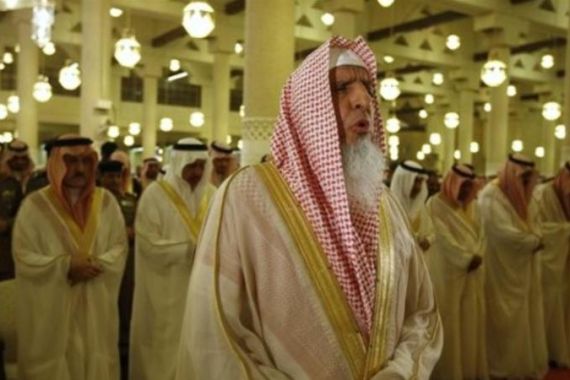Top Saudi cleric says Twitter is for clowns
Grand Mufti criticises microblogging website as a “a council for jokesters” and place for unjust and incorrect messages.

Saudi Arabia’s top religious cleric has criticised the microblogging website Twitter, calling it “a council for jokesters” and a place for unjust, incorrect messages.
Grand Mufti Sheikh Abdul-Aziz Al-Sheikh made the remarks during a speech to other Saudi clerics on Friday.
The mufti’s remarks came on the same day that an imam at Mecca’s Grand Mosque said people had the right to express themselves, but should do so cautiously in order to protect the nation’s prestige and unity.
Earlier this year, the mufti called on Muslims to avoid Twitter as it “invited [people] to throw charges between them, and to lie in a manner that brings fame to some”.
The latest remarks have generated a wide range of reactions on social media.
Abdallah al-Dkhilallah, a Twitter user from Riyadh, said: “Twitter was found for us to unload our oppressed energy and write what’s on our minds. With regards to corruption and clowning, there are stuff more corrupt than Twitter.”
Another Twitter user from the Saudi capital, Abdallah al-Moqhem, said such a description by the mufti is “not appropriate”.
“This council has scholars, literary figures, preachers, and some of them are senior scholars,” he said.
But local journalist Faisel al-Haidari tweeted that the mufti’s remarks were not intended for all Twitter users but for “corrupt” people “who sabotage the thoughts of youth with corrupt tweets”.
Imposing censorship
The two most influential Twitter users in Saudi Arabia are Muslim preachers. Sheikh Mohamad al-Arefe has more than 4.3 million followers, while Sheikh Ayed al-Qarnee has more than 2.8 million.
Rights groups have criticised Saudi Arabia for its limited media freedom.
Abdel Aziz Khoga, the country’s minister for media and culture, admitted to local al-Watan newspaper that a series of government bodies imposed censorship of Twitter.
Last December, Saudi novelist and political analyst Turki al-Hamad was arrested for “insulting Islam”. Saudi intellectuals called for his release, saying his arrest was “condemnable, reprehensible, shameful”.
There are around three million Twitter users in the kingdom, according to one study.
GlobalWebIndex said that of the country’s total internet users, about 51 percent are active on Twitter.
In 2012, Saudi Arabia had the third highest number of Twitter users in the Arab region, according to a social media report by the Dubai School of Government.